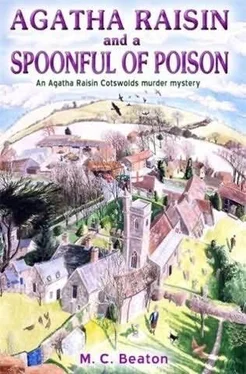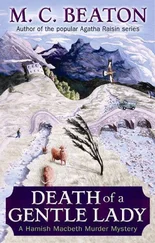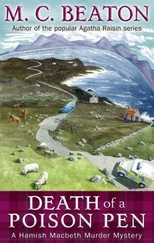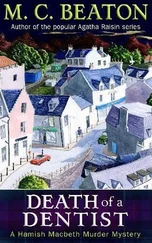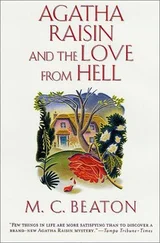“The church is open during the day,” said Toni, “but we’ll need to slip in after the morning service.”
“The book’ll be in the vestry,” said Roy. “I wonder if they keep it locked.”
At that moment, Charles wandered in, having let himself into Agatha’s cottage with his own set of keys. Agatha looked at his concerned face and said, “No, I am not dead yet. I have more important things to think about.”
She told him about Trixie, ending with, “I’d better get Patrick to go. No one knows him.”
“There’s something else I just remembered,” said Toni. “Trixie had these tattoos down her arms.”
“You’re sure?” Agatha frowned. She had never seen Trixie’s arms uncovered. Even the leotard that Trixie had been wearing the first day Agatha had met her had been long-sleeved.
“Did you see what they were like?” asked Roy.
“Yes,” said Toni. “Midlands TV was there and they had this white light panning out over the audience. The tattoos were blue, all blue, like ink.”
“By all that’s holy,” breathed Agatha. “Prison tattoos.”
THE PROBLEM WITH THAT IS,” said Toni, “a lot of young people these days have fake prison tattoos.”
“Yes, but she’s not young,” said Agatha. “We must find out what her maiden name was. I’ll phone Patrick.”
She retreated to the living room. “Aggie’s always been determined to make Trixie the villain,” said Charles. “I hope she doesn’t get too carried away.”
Agatha came back saying, “Patrick’s going over to the church tomorrow. Now I suggest we all go to bed. Charles, if you’re staying, you’ll need to sleep on the couch.”
“It’s all right. I’m going home. I’ll drop by tomorrow to see if there’s any news.”
Agatha slept uneasily, waking several times during the night, worrying about George. She felt he would never forgive her and dreaded that he might try to attack her again. She also worried about Monday morning in the office, when she would need to tell her small staff about the invitation to James’s engagement party. Agatha hated to be pitied. She wanted to be feared, admired or loved, but she did not want to be the object of anyone’s pity.
Roy was startled at breakfast the following morning when Agatha announced that they were going to church.
“Why?” he wailed. “I don’t do church.”
“I want to talk to Mrs. Bloxby.”
“We could go to the vicarage afterwards.”
“I feel guilty about always dropping in on her. Come on. It’ll do our souls good.”
“I didn’t know you had a soul, sweetie.”
Agatha was impatient, her mind racing from one thing that needed doing to another. She found the service interminable. She only relaxed during the long sermon, the vicar’s words drifting in and out of her brain until she fell asleep and was finally awakened by a sharp nudge in her ribs from Roy’s elbow and his voice hissing in her ear, “You’re snoring.”
After the final hymn and the blessing, they filed out of church. Agatha shook hands with the vicar and said, “Fine sermon. Very moving.”
Alf Bloxby replied drily, “But not enough to keep you awake.”
“You must be mistaken. I heard every word,” lied Agatha. She spotted Mrs. Bloxby talking to some of the parishioners and hurried over to her.
“A word in private,” said Agatha, driving off the three women who had been talking to Mrs. Bloxby with a steely glare.
“I hope this is important,” said Mrs. Bloxby. “You interrupted me.”
“Very important. Do you know anything about Trixie Chance?”
“Until her husband approached me about you publicizing the fête, I did not know anything at all about either Mr. Chance or his wife.”
“But you could find out. The clergy gossip to each other.”
“Mrs. Raisin, I will only gossip if it is to a good end. What is your motive?”
Agatha told her about the concert and the tattoos. Mrs. Bloxby frowned. “It is all very thin evidence of wrongdoing, but I will see what I can find out.”
“Thanks!” Agatha charged off, sweeping Roy with her. “We’d better get back home. Patrick should be calling.”
When she got back to her cottage, Agatha checked her answering service. She listened in dismay. Patrick had left a message to say there was no record of the marriage.
Agatha told Roy. “I could go up to London and check at the Records Office,” she said, “but it would take ages. Wait! I’ve an idea. It would be easy if I had an idea of exactly when they got married.”
She phoned Toni. “I want to find out when and where the vicar and Trixie got married. That pig farmer fancies you. Would you mind going to Comfrey Magna and asking him?”
“If his wife’s around, she’ll throw another teapot at me,” said Toni, “but, yes, I’ll try.”
Toni decided to go straight to the pig farm. If Hal’s wife was there, she’d just have to beat a retreat.
As she approached the farm, she saw Hal working in a field near the house. She parked the car, vaulted the fence and went to meet him.
“Well, if it isn’t the prettiest detective in England,” said Hal. “Come to see the pigs?”
“No, I wanted to ask you a question. When did Mr. Chance and his wife get married, and where?”
“Let me see. Must be about ten years ago. We all thought he was a confirmed bachelor. They got married in Moreton Registry Office.”
“Not in church?”
“No, there was something about her having been divorced.”
“You wouldn’t happen to know the date?”
“As a matter of fact, I do. Give us a kiss and I’ll tell you.”
“Tell me first and I’ll give you a kiss,” said Toni.
“Okay. I remember because it was the day of the Moreton Agricultural Show and I got first prize for one of my pigs. That would be on the eighth of September.”
“Ten years ago?”
“Right. Now what about that kiss?”
“Another time.” Toni darted away, jumped the fence, got into her car and drove off.
Agatha did not want to wait until the council offices in Moreton-in-Marsh opened on Monday morning, only perhaps to find that all records of marriages had been sent up to London. She travelled up on the Sunday night with Roy and booked herself into a hotel for the night, then set off to the records office in Finsbury Park the next day.
Eagerly she filled out the required forms and then searched until she found the right book and searched through the pages. Arthur Chance had married Trixie Webster. Her home address was given as 4A Puddleton Close, Cheltenham.
Agatha phoned Phil and told him to take his cameras over to Comfrey Magna and try to capture a discreet shot of Trixie. Before she went to Cheltenham, Agatha wanted to have a photograph to show around. As she travelled in a taxi back to Paddington Station, she could not lose the feeling that somehow the magic of London for her had disappeared. She could not get over the sensation that the great city had somehow become grimy, dingy and unwelcoming. Maybe it had always been like that, she thought, and one actually had to live in the place to like it once more.
I’m getting countrified, thought Agatha as the train slid out of the station. I have a cottage, I have cats, soon I’ll be wearing tweeds. She had always thought of herself as a sophisticated city person, that her stay in the country was perhaps just a phase. She remembered having voiced this idea to Charles, who had said cynically, “Sophisticated City Agatha was just another mask. People do like to glamorize themselves. It saves them from looking at the person they really are.”
“And who am I really?” Agatha had demanded angrily.
But Charles had laughed and said, “I wouldn’t dare tell you.”
Читать дальше
